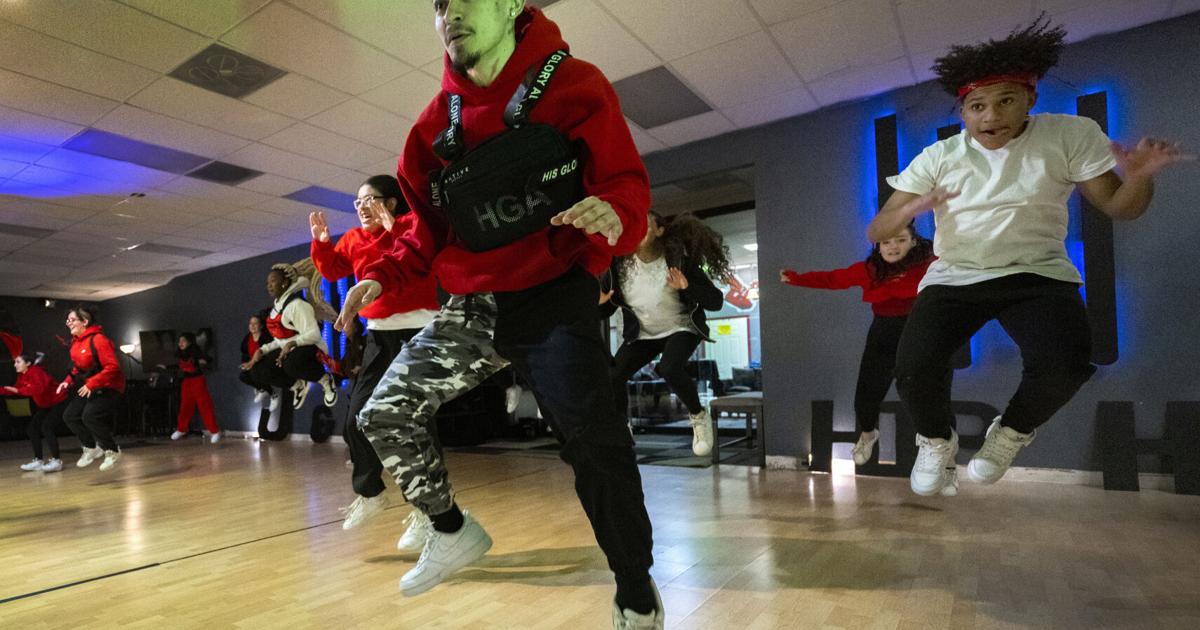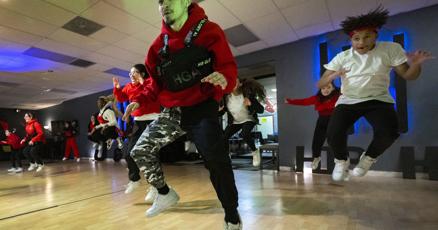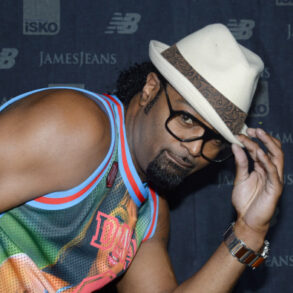
The Street Legends Dance Crew at J&J Hip Hop Dance & Performing Arts Company, led by studio co-owner Joseph Cantu, is preparing for the World of Dance competition in California after earning a spot for the third consecutive year. The 20-person dance team, comprised of teens and 20-somethings, not only focuses on dance but also serves as a faith-based community offering encouragement, inspiration, and a sense of family for its members, who come from diverse backgrounds and have found solace and personal growth through hip-hop dance.
Other kids might be out causing a ruckus on a Saturday night.
Not the kids in the Street Legends Dance Crew at J&J Hip Hop Dance & Performing Arts Company. They have better things to do and moves to make — moves that might earn them a third golden ticket to compete at this summer’s World of Dance competition in California.
The 20-person dance team of teens and 20-somethings sprawls across the studio floor on a January night, quietly listening to studio co-owner Joseph Cantu. Among them are the four Cantu kids, three sons and a daughter, ages 14 to 23, who teach at the studio. Cantu, whom many of the kids call Pastor J, talks about the WOD auditions the faith-based studio will host in April and ends with a prayer of encouragement and love.
“Give these kids the strength to come here to their second home, a place to escape through movement, and where everyone loves them,” he says.
After earning a spot in the competition the last two years, Street Legends came in 11th place in the U.S. last year. Romeo Cantu was dubbed WOD youth all-styles champion last summer. The big win scored him one golden sneaker award that now hangs in the lobby.
Pep talk finished, it’s time to work on their 6-minute hip-hop piece. Joseph’s son LJ takes over, a lithe figure in a black jacket, a red bandana tied around his mop of dark curls. Music mixed by him and his two younger brothers pours out of the speakers as the dancers face the mirrors and burst into motion perfectly paired to the heartbeat of the bass. They don’t get far before the music stops and LJ has them work, chunk by chunk, through the choreography, creating crisp, strong, synchronized arm and leg movements that simmer with emotion.
“This Street Legends team and our company is never going to be just about dance,” said Joseph, who owns the studio with his wife, Stephanie Cantu. “It’s about inspiring and building character and giving kids a home and a place to escape alongside great training and dance.”
This dance team, one of several at the company, is serious business for its auditioned members. Zion Moore makes the trip every weekend from Fort Collins, where she attends college.
“I’ve grown so much as a dancer,” said the 18-year-old. “It’s actual family here — that aspect draws me. They don’t have that in any other studio. We express the gift God gave us through hip-hop. It’s made me a better person and my faith is 10 times stronger in God. I’ve become a better human — thoughtful, caring, sacrificial, committed, driven.”
Elijah Lockette started taking classes at the studio four years ago as a way to rebuild his confidence after getting emotionally beaten down playing soccer at school. The 16-year-old Village High School student eventually worked his way up to a spot on the Street Legends team.
“I didn’t love myself,” he said. “Coming here immediately switched me. People lifted me up instead of tearing me down. It made me more comfortable in my own skin.”
As his son instructs the group, Joseph hovers on the perimeter, intently watching, adding his observations, and then stopping them for another dose of inspiration.
“You’ve got to go all in — don’t do half,” he says. “Hit athlete mode. This is a dream for many of you. Strip out of your mind all doubts of yourself. Achieve the dreams you are fighting for. You have to learn to fight for yourself. I don’t know who that’s for in the room, but I feel like someone needs it.”
Joseph speaks from experience. The same words that pour out of his mouth now would have been helpful to hear as he grew up in a volatile military household that relocated regularly. His mother often abandoned the family and was eventually diagnosed with paranoid schizophrenia. His abusive military father often forgot his two sons were just little boys, not soldiers who needed constant discipline.
The rockiness led to suicidal thoughts at 10 and joining a gang in his teens. But there was one tiny thread of goodness in his life — despite her instability, his mom was an Arthur Murray Latin ballroom instructor. Joseph was often the kid in the corner of the studio, watching her do ballroom and ballet.
“I thought it was cool, but it was the ’80s and I was looking more at hip-hop culture,” he said, “yet there was no guidance in that, so I just copied moves here and there.”
In the mid-’90s Joseph landed at a Santa Barbara, Calif., high school where races rioted against each other regularly. But it was here that dance sunk more deeply into his bones. He witnessed how it could help save and heal people and give them hope.
Staff members, fed up with the death and violence of gang warfare, decided to try using hip-hop culture to bring students together. They brought in a DJ every Friday at lunch and instructed the racial groups to battle it out through dance, not fights. It worked.
“That inspired me, like wow, they just fixed the riots with dance,” Joseph said. “A lot of my friends were freestyle dancers, and they tried to push me in there. They said your mom was a dancer — you can do it. I would freestyle with them sometimes. It scratched that dance itch in me that wanted to come to life.”
When the family moved to Colorado in 1998, he spent a couple of years at Widefield High School where the hip-hip culture looked vastly different from where he’d come from. He persevered, though, and after earning his high school equivalency, spent the next few years teaching dance classes at church and working as a youth pastor.
“I felt like my life was meant to inspire others,” he said. “To give people hope through dance and through a messaging of inspiration. My stories were not there for nothing.”
He met Stephanie, a Springs native and Mitchell High School graduate who also had a passion for music and dance, at church and eventually went on to start their company more than a decade ago. Their mission: welcome kids from all walks of life, particularly those from rough backgrounds, and give them a place to find community and self-expression.
“If you met some of these guys out of the studio, you’d never guess they would move like that,” Joseph said. “A lot of them, with their lifestyle and background and family situations, when they first come to us they’re quiet. In school they’re probably the one no one thinks there’s much to. So what does dance do? It gives them a much louder voice through movement than vocally or expressively. Dance is a therapy.”
Building their company has been a series of struggles and wins. Before they officially opened in 2013, they both taught classes here and there. Joseph did it full time while Stephanie sold real estate. But when the number of kids went from 15 to 150 in 18 months, she quit to also teach full time.
They were doing so many classes at so many locations that when an opportunity came to assume the lease of a dance studio closing its doors they decided to go for it. It was a chance to offer more opportunities to kids who were on waitlists for classes.
The risky choice, coupled with Stephanie giving up her real estate income, left them and their kids homeless for about a year. They bounced around, staying with friends and family while continuing to channel their energy into the new building and business, finally making their way back into a home of their own.
Stephanie wondered at the time if they made the wrong decision.
“But we saw what it was doing for the kids,” she said. “Not only did we, after one year, fill up the space we had for classes, but we had to tear down a wall and we grew to 300 students. We were doing so great for years. We were adding more programs, more teachers, different styles, and then COVID hit.”
Student numbers were sliced in half, but through the grace of grants and donations they survived, only to face another hit a year ago. After seven years at their studio at Oro Blanco Drive and North Carefree Circle, they had to relocate to their current spot in a tiny strip mall eight minutes south, off North Academy Boulevard.
They’re settling into the new space, which still needs some mirrors and flooring, but the numbers are good: about 370 students, which isn’t too far from the 400 they had before the pandemic; 32 classes for children, teens and adults in styles such as ballet, tap, contemporary, lyrical hip-hop, krump, musical theater and contemporary; and 17 instructors.
“We’re finally feeling like we’re turning that page where we’re going to be OK,” Stephanie said. “A lot of the families we work with are underprivileged, so a lot of these kids don’t have the funds like other dance studios do. We used to offer scholarships when we had the means. We still do have a lot of need for that but we’re doing better now.”
Over the years, the dance company has been one of the city’s go-to studios for professional performances. Their dance teams have performed during Harlem Globetrotters shows at The Broadmoor World Arena, during halftime at Denver Nuggets and Switchbacks games, and at events hosted by the Cultural Office of the Pikes Peak Region, Better Business Bureau of Southern Colorado and other organizations.
What’s most important to them, though, is being a safe haven for kids who need stability and a positive atmosphere.
“These kids wouldn’t have a home and several of them would not be alive if we were not here today,” Joseph said.
“That’s how intense it is. Some of them have fought for their lives and through mental stuff and were on the brink of losing that battle, but they continue to be reminded they have a home to come to. We have not gone down easy. We are fighters. We love what we do, and we know it’s changing lives so we are here to stay.”
Contact the writer: 636-0270
This post was originally published on this site be sure to check out more of their content.





